Page Content
Teacher workshop participants create a skit to represent barriers faced by girls.
What is Project Overseas?
Project Overseas is a joint endeavour by the Canadian Teachers’ Federation (CTF) and its member organizations to give professional assistance to fellow teachers in developing countries. The project takes place during the months of July and August.
Started in 1962 with one program in Nigeria, Project Overseas has helped teacher organizations in more than 50 countries in Africa, Asia, the Caribbean and the South Pacific. Since its inception, more than 1,800 Canadian teachers have participated in the program. Currently, approximately 50 volunteers are sent each summer to about a dozen countries.
Application deadline approaching
The deadline to apply for Project Overseas this year is midnight on Nov. 1.
More information is available on the ATA home page at www.teachers.ab.ca.
|
Challenging and powerful
Ellen Braaten
For two weeks at the beginning of July, I had the amazing privilege of joining three colleagues from across Canada to partner in a “train the trainer” project in the West African country of Sierra Leone. To give readers some context, this country had the first university in Western Africa in the 1800s, is the setting for stories such as Blood Diamond and The Book of Negroes, went through an 11-year civil war in the 1990s and suffered a recent ebola outbreak.
After a long overseas flight, our team arrived in the capital city of Freetown on July 6. Once in this historic city, the site of the 1787 settlement for repatriated slaves from Nova Scotia, we were hosted by the Sierra Leone Teachers Union. We spent the next week working closely with five local educators to train a group of 40 teachers in topics such as literacy, numeracy, peace education and teachers action for girls. The following week we all travelled to the country’s southern region, where those 40 teachers led sessions teaching the same topics to a group of 100 teachers from the surrounding area.
The experience challenged me physically, professionally and personally as I worked alongside colleagues who teach in very different conditions from what I am used to. It was very powerful to watch female colleagues who had grown up fighting to be recognized as capable human beings as they passionately inspired their peers to take action to give dignity and educational opportunities to the girls in their communities.
It excited me to hear of the new government’s plans to increase access to education through funding and reforms. It filled me with gratitude to think of my stable job with predictable pay, my well-equipped school, and my many opportunities for professional development as I got to know other teachers who approach their jobs with passion regardless of the absence of the privileges that I enjoy every day. ❚
Ellen Braaten is a Grade 5 teacher at Monterey Park School in Calgary.
Project a great way to give back
Christine Magill
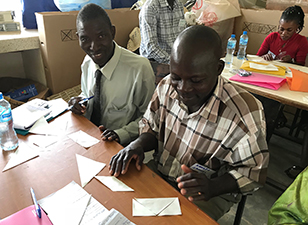
Ugandan teachers learn how to make and use tangrams. |
After my fellow team members and I arrived in Uganda, we met our local co-tutors. These were Ugandan teachers who work as instructional coaches with the Ugandan Teachers Union. My partner was Anthony and we immediately clicked. We were in charge of planning a numeracy workshop. We both had ideas for activities and quickly decided on a theme for each of our three lessons with an overall goal of focusing on engaging student centres.
The next two weeks were spent running our workshops. Each week we had 80 teachers take part in the program. On the weekends we visited some local sites, including a history museum and Victoria Lake, where we saw the source of the Nile.
The workshops were a rewarding experience. It was my first time co-teaching and I loved working with another teacher and running a class together. I learned a lot about creative ways to use local materials for instruction and was inspired by the participants’ excitement and enthusiasm. Many worked in very challenging conditions with chronic attendance issues, no resources or books for their students and very large class sizes. Some teachers were dealing with class sizes of 100 to 200 students, but despite the difficulties they were excited to try new tools.
In the past I have travelled and participated in many other international volunteer projects and Project Overseas was by far the best organized and facilitated program I have been a part of. The long-term and lasting impact of the project was clear, and it was hard to say goodbye at the end of the trip. The teacher participants all expressed their desire to continue to have access to professional development and a wish that all teachers would have a chance to participate in similar workshops.
Since returning to Canada we have been sent videos and photos of teachers applying and using the strategies and tools from the workshop in their classrooms. It is difficult to put into words how rewarding it has been seeing the clear impact the workshops have had and the chain reaction effect they are having on student learning. I will always be grateful to have been part of such an amazing experience, and strongly recommend Project Overseas for those looking for a way to give back and support other educators. ❚
Christine Magill teaches high school math, social studies and Aboriginal studies in Strathmore.
The most rewarding experience of my career
Lawrence Hunter
|
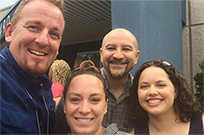 Nkabom Team 2018 (L-R): Lawrence Hunter (ATA), Stephanie Marr (NBTA), David Douglass (ETFO) and Julia DeGirolamo (ATA) Nkabom Team 2018 (L-R): Lawrence Hunter (ATA), Stephanie Marr (NBTA), David Douglass (ETFO) and Julia DeGirolamo (ATA)
|
I first went to Ghana with Project Overseas in 2016 as part of the new entrants team and I knew I would return. This year I had the pleasure of returning as the Nkabom team leader.
In co-operation with local co-tutors, the Canadian team prepared and presented professional development workshops to approximately 500 teachers and headmasters from the Ghana National Association of Teachers (GNAT). The workshops became a collaborative exchange, an open dialogue of ideas and best practices. It was very humbling to hear their stories of no teaching resources, crumbling schools, teaching under trees, 150 students in a class, students working well below grade level, language barriers, cultural division and teachers going for months without pay. Having a team of outstanding Canadian teachers and eager participation from the Ghanaian teachers made the workshops a great success. The off-duty hours were always a treat. As we enjoyed local meals of jollof rice, fufu, banku, kenkey and red-red, thousands of fruit bats would fly overhead. Procuring fresh fruit, groceries and personal souvenirs from local markets required haggling and the expectation of a humorous exchange of insults during the negotiaons. The bright colours of the Kente cloth and glass beads were quickly adopted into our wardrobe.
| The workshops became a collaborative exchange, an open dialogue of ideas and best practices. |
Kakum National Forest offered a breathtaking walk in the treetops, Elmina Castle was a reminder of a darker history, and Kintampo Falls provided a reprieve from the heat. A safari in Mole National Park was a highlight that brought us face to face with kob, waterbuck, duiker, warthogs, baboons, monkeys and elephants. Floor hockey and traditional drums and dance were huge hits during the intercultural exchange of Canada–Ghana Night.
Being part of Project Overseas has been the most rewarding experience of my teaching career thus far. ❚
Lawrence Hunter teaches at L.Y. Cairns School in Edmonton.
Sierra Leone provides life lessons
Carmen Pon
|
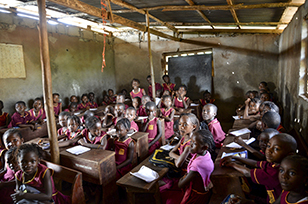 Project Overseas participants visited the Sierra Leone cities of Bo and Freetown, where they delivered workshops and sessions on a number of topics. Project Overseas participants visited the Sierra Leone cities of Bo and Freetown, where they delivered workshops and sessions on a number of topics.
|
Our CTF team had the fortune of collaborating with educators from Sierra Leone. Over the course of six months, we met regularly online to prepare for the training ahead and forged new friendships. We then traveled to Freetown and Bo and conducted workshops in numeracy, literacy, peace education and sessions on girls’ education, as well as topics in health education and disaster preparedness.
The collaborative project with the Sierra Leone Teachers’ Union (SLTU) provided useful insight into education in developing contexts. We were able to visit a school, chat with participants about their experiences, and examine the curricula and textbooks used. This experience has helped me understand the ways in which we can bridge education for newcomers as well as enabled me to think creatively about teaching with limited materials.
The education system in Sierra Leone faces a number of challenges, but having worked in partnership with SLTU, I have no doubt that the new generation of teacher trainers have the skills and knowledge to move forward in an era of free education for all children. The trainers’ enthusiasm was clearly demonstrated in their eagerness to explore new techniques. One of my favourite memories was playing numeracy hopscotch and other math games with the participants. Pedagogy aside, I feel much could be learned from Sierra Leone in terms of religious tolerance and reconciliation. It is truly a nation of resilient people. ❚
Carmen Pon is a Grade 6 teacher with Edmonton Public Schools. She is currently on leave in order to pursue a PhD in education and international development.
A summer like no other
Carolyn Weiler
|
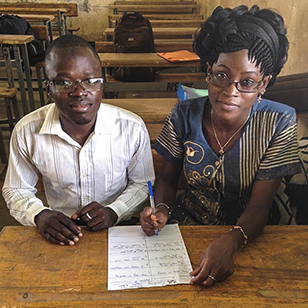
Teachers practice a co-operative learning task called rally coach.
|
As part of a team of three incredible Canadian teachers, I travelled to Ouagadougou, the capital city of the west African nation of Burkina Faso. Our team worked with two partner organizations: the primary teachers union (SNEA-B) and the secondary teachers’ union (SNESS).
Each Canadian teacher was partnered with a Burkina teacher trainer. Together we planned and put into
action various professional development workshops for groups of about 65 participating teachers.
I was surprised at the universal nature of the topics of general pedagogy, such as inclusion, differentiation, gender equality, critical thinking and growth mindset, among others. As well, my teacher partner and I led workshops on French grammar, as well as on French reading strategies. As class sizes were very large, (70 to 100 students!), there was much need for differentiation and co-operative learning. I was able to integrate many co-operative learning structures that I use regularly at home in my classroom.
We also shared some of our Canadian culture with the participants during our Canadian “soiree.” Everyone especially loved tasting maple syrup!
The teacher participants were incredibly receptive and grateful for all of the workshops. They enjoyed the many icebreaker-type activities that we used, and especially seemed to love learning how to use games to teach curriculum!
Being a French immersion teacher, I was challenged to do workshops for teachers of English Second Language (ESL). How fun to see that universal strategies can be used no matter the language of instruction.
This experience is certainly life-changing in that we see first-hand that the nature of teachers is worldwide: we all want the best for our students and we all try to do our best in our own teaching circumstances. Despite their lack of technology, books, and hands-on math and science materials, these teachers achieve so much with their students.
As Canadian teachers, the goal of this project was to add some teaching tools to the tool belt of our colleagues in Burkina Faso, but I know that I came away with much more. The Burkinabé are a proud and dedicated people. My own attitude and understanding of the world have been influenced by this experience. I was inspired by each of these educators, who do so much with so little, who want the best for their students and who work hard to educate their most precious resources.
“Former les gens, ce n’est pas remplir une vase, c’est allumer un feu.” ❚
Carolyn Weiler teaches Grade 2 French immersion at Ecole Connaught School in Medicine Hat.
Our journey continues
Betty Fu
|
I am thankful that in an increasingly technological world we are able to maintain the important connections we have built and can continue our partnerships and friendships even after our summer course officially concluded.
|
This summer I travelled with five other teachers from across Canada to collaborate with the Grenada Union of Teachers (GUT). Our team partnered with the GUT to provide a two-week summer course for teachers on the following topics: trade unionism and leadership, literacy, theatre and dance, numeracy and information technology. I worked alongside Dennie Walker, an information and technology specialist, to help teachers find ways to integrate technology into their classrooms and to use technology to support planning, classroom management, assessment and reporting.
I learned so much from my Grenadian colleagues and was truly inspired by their passion and love of education. The teachers in the course spoke of their diverse classrooms and the need to engage learners at all levels, a common goal shared by teachers in Grenada and Canada! I was encouraged by their innovative solutions for the increasing complexity they face each day and am eager to apply the ideas and strategies they shared in my own classroom and teaching practices.
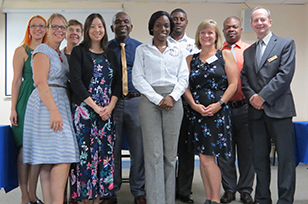
Canadian teachers meet colleagues belonging to the Grenada Union of Teachers. |
I am thankful that in an increasingly technological world we are able to maintain the important connections we have built and can continue our partnerships and friendships even after our summer course officially concluded. Our journey together has only begun and I look forward to contributing towards building a global education community that supports publicly funded education. ❚
Betty Fu teaches junior high science in Edmonton.
A journey of personal growth
Julia DeGirolamo
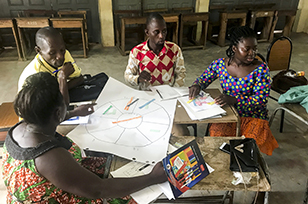
Participants in a numeracy session learn how to build critical thinking and deeper understanding into math instruction. |
“We live to teach” is the motto of the Ghana National Association of Teachers (GNAT). I had the privilege of witnessing that energy first hand, an experience that will stay with me forever. This summer, I was fortunate to be chosen by the ATA and CTF to participate in Project Overseas. Along with seven other Canadian teachers, I traveled to Kumasi, Ghana where we partnered with GNAT to deliver professional development workshops to over 400 Ghanaian teachers.
Alongside GNAT co-tutors, our team ran three week-long sessions on a variety of teaching and learning topics. My sessions focused on numeracy. Meeting the teachers of Ghana and hearing their stories and struggles made me aware of how much we have in Canada. The biggest challenge for us was to strip away all of the fancy resources, manipulatives and technology from our teaching practice and still provide meaningful and relevant sessions for our participants. This experience inevitably strengthened my own teaching and I learned far more from them than I could have ever anticipated. The Ghanaian teachers are incredibly resilient people who embody the spirit of “We live to teach.”
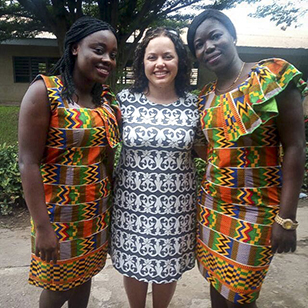 Over the last 10 years, my teaching career and love of travel has allowed me to explore countries across five different continents. This love of travel and passion for teaching is what initially drew my attention to Project Overseas. I very quickly realized that the project was less about travel and more about personal growth and forming relationships. The days could be long and exhausting, but the weeks were short. At the end of our month together, I didn’t want to say goodbye to my team, who had become family, and the incredible people of Ghana.
Over the last 10 years, my teaching career and love of travel has allowed me to explore countries across five different continents. This love of travel and passion for teaching is what initially drew my attention to Project Overseas. I very quickly realized that the project was less about travel and more about personal growth and forming relationships. The days could be long and exhausting, but the weeks were short. At the end of our month together, I didn’t want to say goodbye to my team, who had become family, and the incredible people of Ghana.
Project Overseas wouldn’t happen without the passionate and hardworking teachers who live to teach! I feel privileged to have been part of that group. ❚
Julia DeGirolamo is a Grade 5 teacher at St. Wilfrid Elementary School in Calgary.
An experience of warmth and growth
Kim Carson
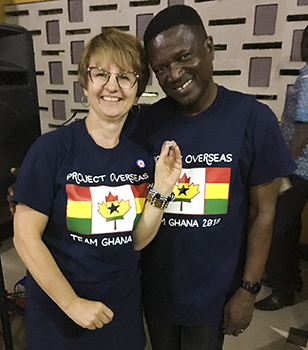
Kim Carson presents her colleague Ernest Asamoa with an ATA pin. |
When I received notice that I had been selected to work alongside teachers in Ghana, Alberta was in the depths of a winter freeze. I could not wait to feel the warmth of the Ghanaian sun on my face. Throughout the next five months, my Canadian team met online on a regular basis to plan and prepare for the summer workshops. From the moment that my team of four landed in Accra, the only thing we experienced that was warmer than the sun were the kind, caring people of Ghana.
During the three weeks of the workshops, approximately 240 teachers from various regions gathered at the Kumasi Anglican Secondary School. With the support of a co-tutor, we delivered three sessions: Understanding the Beginning Teacher, What is Mentorship? and Teacher Wellness to beginning and head teachers.
My Canadian colleagues also delivered sessions in conjunction with their co-tutors. Regardless of the planned activities, teachers were keen to try new techniques, participated fully, explored ways to embed the ideas into their practice, and were committed to sharing their learnings with their colleagues back at their respective schools.
Project Overseas provides Canadian teachers with the opportunity to enhance their global perspectives on teaching and learning from their national and international colleagues. During our stay in Ghana, the Ghana National Association of Teachers (GNAT), provided opportunities for the Canadian team to gain further insights into the people and culture. We are grateful for the time and commitment the union representatives extended to us to enrich our time. Through every experience it was evident that GNAT is a well-respected organization in their country. Their ongoing commitment and dedication to the teachers of Ghana was apparent in their daily interactions. Working alongside this professional organization enabled me to understand some of the complexities and celebrations the teachers in Ghana encounter.
I am grateful to the Alberta Teachers’ Association and CTF for their commitment to Project Overseas and for providing me with the opportunity to represent our union, province and country. The personal and professional benefits one gains can only be acquired through first-hand experience. Ghana will always hold a special place in my heart. ❚
Kim Carson is the principal of Thorhild Central School.
Project Overseas recognizes the value of developing education globally
Robert McKague
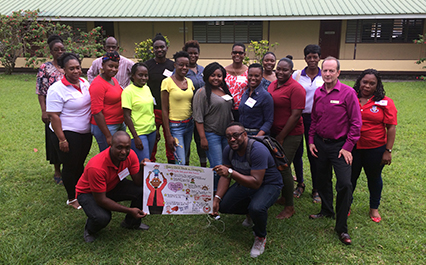
Robert McKague poses for a photo with Grenada teachers enrolled in his leadership development and public speaking class. The poster states “Every Student needs a Champion.” Adopted by teachers from Calgary Separate Local No. 55, the initiative involves teachers acting as champions for each of their students. |
This year I had the life-changing assignment of leading a team to Grenada. The Canadian team was hosted by the Grenada Union of Teachers, which displayed amazing hospitality that far exceeded everyone’s expectations.
Volunteering for two weeks in Grenada changed the teaching careers of all our team members, who all commented that the teachers in Canada take for granted all the resources they have in abundance. The Grenada project was composed of teachers from all across Canada and delivered professional development in numeracy, early childhood literacy, computers, drama and leadership development.
Many of the Grenada teachers are working with no books, crayons, paper or computers. As the project’s team leader I was fortunate to receive $500 from the ATA Local 55 in Calgary, which I used to purchase an abundance of school supplies. It made many teachers smile to be able to use coloured markers for the first time.
Participating in Project Overseas has certainly been a highlight of my teaching career. I would like to thank the Alberta Teachers’ Association as well as the Canadian Teachers’ Federation for providing me the opportunity to help teachers in their mission to provide quality education globally. ❚
Robert McKague teaches woodworking and design at St. Brigid and Our Lady of Grace School in Calgary.
